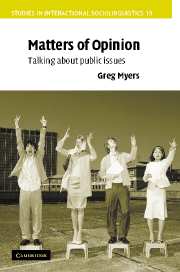Book contents
- Frontmatter
- Contents
- Acknowledgments
- Transcription conventions
- Focus-group data
- 1 Paradoxes of opinion
- 2 A tool kit for analysing group discussions
- 3 Forums for opinion: ‘What is it that's going on here?’
- 4 Institutions of opinion: voice of the people?
- 5 Topics in interaction: ‘Why that now?’
- 6 Agreeing and disagreeing: maintaining sociable argument
- 7 Representing speech: other voices, other places
- 8 Questioning expertise: Who says?
- 9 Radio phone-ins: mediated sociable argument
- 10 Vox pop television interviews: constructing the public
- 11 Opinions as talk
- References
- Index
9 - Radio phone-ins: mediated sociable argument
Published online by Cambridge University Press: 22 September 2009
- Frontmatter
- Contents
- Acknowledgments
- Transcription conventions
- Focus-group data
- 1 Paradoxes of opinion
- 2 A tool kit for analysing group discussions
- 3 Forums for opinion: ‘What is it that's going on here?’
- 4 Institutions of opinion: voice of the people?
- 5 Topics in interaction: ‘Why that now?’
- 6 Agreeing and disagreeing: maintaining sociable argument
- 7 Representing speech: other voices, other places
- 8 Questioning expertise: Who says?
- 9 Radio phone-ins: mediated sociable argument
- 10 Vox pop television interviews: constructing the public
- 11 Opinions as talk
- References
- Index
Summary
The discussions that I have been analysing in Chapters 5–8 took place upstairs in a pub, in a hotel conference centre, or in a rented living room. However powerful the utterance of a participant in a focus group, it stays in that room. Opinions that reach out beyond the immediate setting have to be mediated in some way. And the media are full of opinions. Niklas Luhmann notes, in his lectures on media,
A considerable part of the material for press, radio, and television comes about because the media are reflected in themselves and they treat this in turn as an event. People might be asked for their opinions, or they might impose them. But these are always events which would not take place at all were there no mass media.
(Luhmann 2000)Of course most of these opinions are from public figures, as in the interviews I referred to in Chapter 2. But there are also events in which individual members of the public call or are called on to give their opinions – polls, talk shows, formal debates, letters to the editor, Internet discussion lists. In this chapter I focus on sociable argument in phone-ins; in the next I look at vox pops in terms of categorization and constitution of a category of ‘public opinion.’
- Type
- Chapter
- Information
- Matters of OpinionTalking About Public Issues, pp. 179 - 202Publisher: Cambridge University PressPrint publication year: 2004



